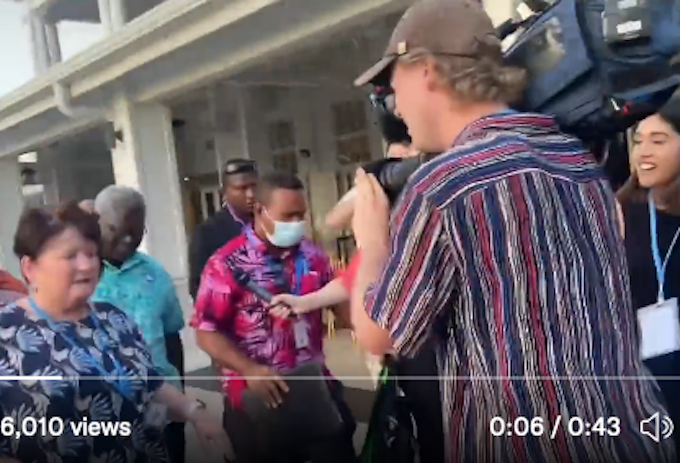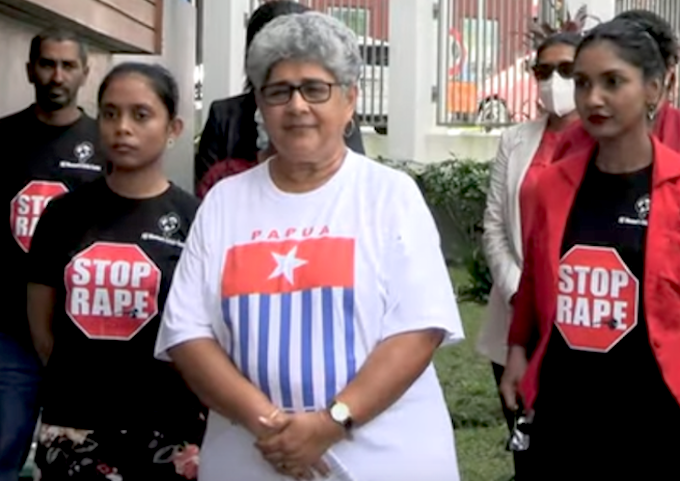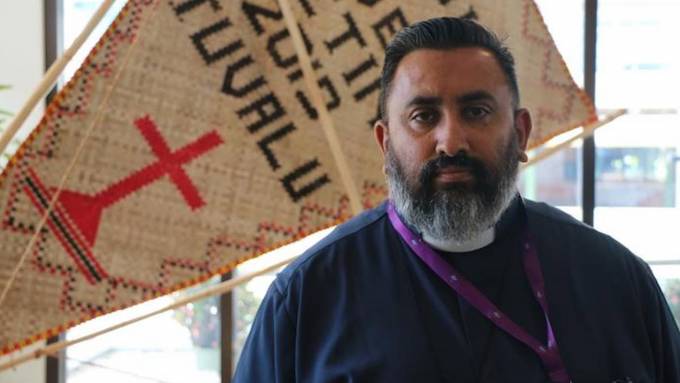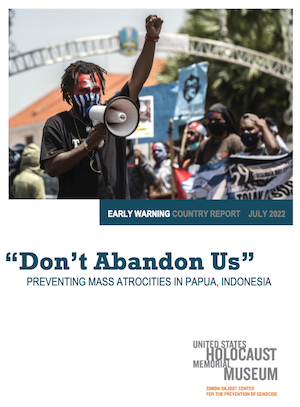By Asia Pacific Report editor David Robie
A lively 43sec video clip surfaced during last week’s Pacific Islands Forum in the Fiji capital of Suva — the first live leaders’ forum in three years since Tuvalu, due to the covid pandemic.
Posted on Twitter by Guardian Australia’s Pacific Project editor Kate Lyons it showed the doorstopping of Solomon Islands Prime Minister Manasseh Sogavare by a melee of mainly Australian journalists.
The aloof Sogavare was being tracked over questions about security and China’s possible military designs for the Melanesian nation.

But Lyons made a comment directed more at questioning journalists themselves about their newsgathering style:
“Australian media attempt to get a response from PM Sogavare, who has refused to answer questions from international media since the signing of the China security deal, on his way to a bilateral with PM Albanese. He stayed smilingly silent.”
Prominent Samoan journalist, columnist and member of the International Federation of Journalists (IFJ) gender council Lagipoiva Cherelle Jackson picked up the thread, saying: “Let’s talk western journalism vs Pacific doorstop approaches.”
Lagipoiva highlighted for her followers the fact that “the journos engaged in this approach are all white”. She continued:
‘A respect thing’
“We don’t really do this in the Pacific to PI leaders. it’s a respect thing. However there is merit to this approach.”
A “confrontational” approach isn’t generally practised in the Pacific – “in Samoa, doorstops are still respectful.”
A thread⤵️
Let’s talk western journalism vs. Pacific journalism doorstop approaches. You will see in this, that the journos engaged in this approach are all white. We don’t really do this in the Pacific to PI leaders. It’s a respect thing. However there is merit to this approach. https://t.co/GcsJVDICFb— lagipoiva (@lagipoiva) July 14, 2022
But she admitted that Pacific journalists sometimes “leaned” on western journalists to ask the hard questions when PI leaders would “disregard local journalists”.
“Even though this approach is very jarring”, she added, “it is also a necessary tactic to hold Pacific island leaders accountable.”
So here is the rub. Where were the hard questions in Suva — whether “western or Pacific-style” — about West Papua and Indonesian human rights abuses against a Melanesian neighbour? Surely here was a prime case in favour of doorstopping with a fresh outbreak of violations by Indonesian security forces – an estimated 21,000 troops are now deployed in Papua and West Papua provinces — in the news coinciding with the Forum unfolding on July 11-14.
In her wrap about the Forum in The Guardian, Lyons wrote about how smiles and unity in Suva – “with the notable exception of Kiribati” – were masking the tough questions being shelved for another day.
“Take coal. This will inevitably be a sticking point between Pacific countries and Australia, but apparently did not come up at all in discussions,” she wrote.
“The other conversation that has been put off is China.
“Pacific leaders have demonstrated in recent months how important the Pacific Islands Forum bloc is when negotiating with the superpower.”
Forum ‘failed moral obligation’
In a column in DevPolicy Blog this week, Fiji opposition National Federation Party (NFP) leader and former University of the South Pacific economics professor Dr Biman Prasad criticised forum leaders — and particularly Australia and New Zealand — over the “deafening silence” about declining standards of democracy and governance.
While acknowledging that an emphasis on the climate crisis was necessary and welcome, he said: “Human rights – including freedom of speech – underpin all other rights, and it is unfortunate that that this Forum failed in its moral obligation to send out a strong message of its commitment to upholding these rights.”
Back to West Papua, arguably the most explosive security issue confronting the Pacific and yet inexplicably virtually ignored by the Australian and New Zealand governments and news media. The final PIF communiqué failed to mention West Papua.

In Suva, it was left to non-government organisations and advocacy groups such as the Australia West Papua Association (AWPA) and the Fiji Women’s Crisis Centre (FWCC) to carry the Morning Star banner of resistance — as West Papua’s banned flag is named.
The Fiji women’s advocacy group condemned their government and host Prime Minister Bainimarama for remaining silent over the human rights violations in West Papua, saying that women and girls were “suffering twofold” due to the increased militarisation of the two provinces of Papua and West Papuan by the “cruel Indonesian government”.
Spokesperson Joe Collins of the Sydney-based AWPA said the Fiji Forum was a “missed opportunity” to help people who were suffering at the hands of Jakarta actions.
“It’s very important that West Papua appears to be making progress,” he said, particularly in this Melanesian region which had the support of Pacific people.
Intensified violence in Papua
The day after the Forum ended, Pacific Conference of Churches (PCC) general secretary Reverend James Bhagwan highlighted in an interview with FijiVillage how 100,000 people had been displaced due to intensified violence in the “land of Papua”.

He said the increasing number of casualties of West Papuans was hard to determine because no humanitarian agencies, NGOs or journalists were allowed to enter the region and report on the humanitarian crisis.
Reverend Bhagwan also stressed that covid-19 and climate change reminded Pacific people that there needed to be an “expanded concept of security” that included human security and humanitarian assistance.
In London, the Indonesian human rights advocacy group Tapol expressed “deep sorrow” over the recent events coinciding with the Forum, and condemned the escalating violence by Jakarta’s security forces and the retaliation by resistance groups.
Tapol cited “the destruction and repressive actions of the security forces at the Paniai Regent’s Office (Kantor Bupati Paniai) that caused the death of one person and the injury of others on July 5″.
It also condemned the “shootings and unlawful killings’ of at least 11 civilians reportedly carried out by armed groups in Nduga on July 16.
“Acts of violence against civilians, when they lead to deaths — whoever is responsible — should be condemned,” Tapol said.
“We call on these two incidents to be investigated in an impartial, independent, appropriate and comprehensive manner by those who have the authority and competency to do so.”

Early atrocities warning
A new report published this week, “Don’t abandon us’: Preventing mass atrocities in Papua, Indonesia,” by the Early Warning Project, suggests two “plausible mass atrocity scenarios” in the two Melanesian provinces of Papua and Papua Barat.
“In both, atrocities would be committed by militia with tacit support or acquiescence from Indonesian security forces, in response to increasing protests and/or rebel attacks by Indigenous Papuans demanding independence from Indonesia.”
The report praised the role of two independent indigenous media, Jubi and Suara Papua, for providing “balanced news about Papua” in contrast to Indonesian “mouthpiece” media.
“Jubi and Suara Papua are often seen as representing the views of Indigenous Papuans. However, the Indonesian government and security forces view Jubi and Suara Papua as tools of the separatists,” the report said.
“In April 2021, Jubi’s editor-in-chief, Victor Mambor, who [has] often received threats and intimidation, had his car vandalised by unknown people. Suara Papua’s website has repeatedly been hacked and its editors regularly harassed and intimidated.
“Media like Jubi and Suara Papua mitigate mass atrocity risk in Papua because they strive for objective journalism and represent the views of the Papuan people, who are often portrayed negatively by national and local media.”

